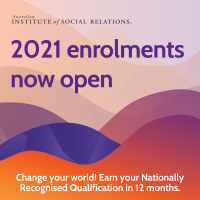
Enrolments open now for our nationally accredited courses.
Change your world? Challenge accepted! Gain your qualification in 12 months.
The Institute provides dedicated support, practical and flexible learning, and excellent career pathways.
The community services sector is one of the largest in Australia. The Federal Government predicts the sector to be one of the highest growth employment fields of the next five years.
Combine your life experience with our high quality education to empower and help others. Students in relevant qualifications will also get hands-on experience within the Relationships Australia network.
South Australian students may be eligible for government subsidies. Intake numbers are strictly limited. Our small intakes ensure a personalised learning experience.
Enrolments close 31 January 2021 (or when full).
Want to explore all your options? Book a call with our Training and Education Advisor, when it suits you.
Certificate III in Community Services (CHC32015)
Become the voice the community needs and contribute to social change in community settings or community-based programs.
Develop the skills to effectively respond to clients’ needs, refer to suitable services, work with people from culturally and linguistically diverse backgrounds, follow safe work practices and manage personal stressors at work.
The number of Welfare Support Workers is expected to grow strongly over the next 5 years. SA Government subsidies are available for eligible applicants.
We also offer:
Certificate IV of Community Services (CHC42015)
Diploma of Community Services (CHC52015)
Click here for all Community Services qualifications

Certificate IV in Youth Work (CHC40413)
Develop the skills and knowledge to create, facilitate and coordinate projects for young people. Youth workers aim to empower young people to develop resilience, make healthy choices and find meaningful pathways to success.
This training program is underpinned by the practice wisdom of SCILS, a youth specific service at Relationships Australia South Australia. Students will engage and learn from Youth Workers in the field and eligible students can complete the work placement component at SCILS.
Gain an understanding of working within the Flexible Learning Option (FLO) enrolment strategy, to help retain young people identified as at risk of disengaging from mainstream school-based learning,
SA Government subsidies are available for eligible applicants.
Click here for more information on Youth Work

Diploma of Financial Counselling (CHC51115)
Gain the skills and knowledge required to work as a financial counsellor; support people in need within a community legal or community services organisation. Financial counsellors have specialist knowledge of legal remedies and options to manage debt and financial difficulty, working as advocates to empower their clients.
Working within a framework of social justice, financial counselling is a blend of counselling and advocacy. Financial counsellors require considerable knowledge in areas of law and policy, including; consumer credit law, bankruptcy, industry hardship policies, government concession frameworks and debt enforcement practices.
Separate from the work of financial planners or advisers or therapeutic counsellors, the title of ‘counsellor’ reflects the way in which other issues may interact with financial issues. Psychological issues, which affect individuals, families and groups, such as; gambling, substance abuse, child abuse and mental or physical health problems, require informed responses from financial counsellors and referral to appropriate professional support.
We also offer:
Diploma of Counselling (CHC51015)
Graduate Diploma of Relationship Counselling (CHC81015)
Click here for all Counselling qualifications

Graduate Diploma of Family Dispute Resolution (CHC81115)
Develop the skills and knowledge to help separating parties make decisions that result from their situation. Prerequisites for entry apply. Many students, already working in the family law or psychology fields, extend their professional expertise to include mediation with this qualification.
The qualification prepares learners to assess for relationship safety and respond appropriately to domestic and family violence. It also equips learners to develop culturally appropriate skills and understandings for working with couples and families from diverse communities.
Being employed as a Family Dispute Resolution Practitioner is important and challenging work. Assist separating couples by facilitating conversations around sensitive matters, to develop their own agreements. Help separating parties identify assets and debts and decide how they will be shared, and help parties reach parenting agreements for children’s well-being and care.
Click here for more information on becoming an FDRP
At the Institute, we understand the needs of learners from diverse backgrounds. We know how to support individuals in an engaging learning environment and best tailor education to different styles of learning.

